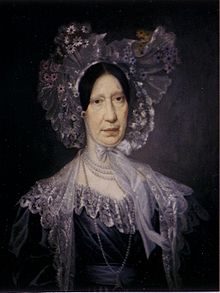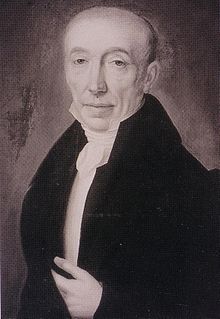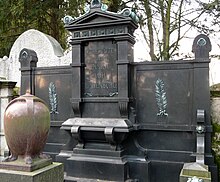Wolf Ladenburg
Wolf Hajum Ladenburg (born January 25, 1766 in Mannheim ; † September 9, 1851 there ) was a citizen (from 1809), trader, banker and founder (1785) of the Ladenburg bank in Mannheim, head of the Jewish community in Mannheim and a member of the senior council of the Israelites of Baden (1825–1845).
family
Ladenburg came from a Jewish family of traders from Neuburg an der Donau and was the son of Hajum Moses Hirsch Ladenburg (he) (died 1781) from Ladenburg near Mannheim and his wife Terza Moyses - she later called herself Theresa Grötzinger - the ancestors of the Ladenburg family in Mannheim. The grandfather Moses Zwi Hirsch Neuburger (died around 1765/70) was a rabbi and merchant in Ladenburg.
Ladenburg married on June 22, 1785 in Mannheim Wilhelmine (Mina) Lorch (born February 8, 1770 in Mainz ; died February 9, 1855 in Mannheim), daughter of the merchant Löw Lorch, protective Jew in Mainz, and the Riffke Silz.
His grandson Carl Ladenburg (1827–1909), banker and entrepreneur, was a member of the Baden state parliament and in 1907 became an honorary citizen of Mannheim.
His great-grandson was the well-known conductor Hermann Levi (1839–1900).
Life
Due to the early death of his father, Wolf Ladenburg was responsible for the care of his mother and sister Deiche and thus forced to become independent. At the young age of only 20, after receiving the right of protection and a marriage permit in Mannheim in 1785 , on June 21, 1785, exactly one day before his wedding to Wilhelmine Lorch, he founded a jewelery shop without any previous commercial training Money market business, with which he later connected a bill of exchange business and ultimately created the “Bankhaus Ladenburg”.
In 1803 he was one of the representatives of the Baden Jews at the homage ceremony on the occasion of Mannheim's transition to Baden.
In 1807 he bought house number 5 in F3 square for 11,500 guilders , of which he paid 8,000 guilders in cash, which documents his prosperity, the rest in Bavarian government bonds . Square F3 belongs to the 4th district, to which the Jewish families were relegated together with the 3rd district. In the same year he was involved in the reorganization of the Lyceum (later Karl-Friedrich-Gymnasium ).
As a result of the 9th constitutional edict of January 13, 1809, the " Jewish edict ", the previous "protection and trading Jew" Ladenburg acquired citizenship and was in the same year - together with the court factor Gottschalk Mayer , whose son Hayum Mayer in 1806 Ladenburgs Daughter Rebekka had married - one of only five Mannheim representatives at the first state deputy meeting of Baden Jews in Karlsruhe . The most important point of advice was school and vocational training for young people. In 1816 he was also a co-founder of an Israelite private school, which was officially recognized in 1821 as the first public elementary school for boys and girls.
In June 1816 Wolf Ladenburg was amazingly, even active in arms trade: he sold it to King Maximilian I of Bavaria to equip the Frankenthaler vigilantes Russian, for the military useless rifles at a price of 3 florins 20 crowns, of which he still had 3000 pieces.
In 1823 he bought the larger house D3, 12 (later D3, 14) and in 1832 the neighboring house D3, 13.
In April 1825, Wolf, as a “good patriot”, was one of the signatories of a petition to the 2nd Chamber of the Estates Assembly against state discrimination against Jews. It says:
“What is the reason that we should be deprived of full civil rights even longer in a state in which we have fulfilled all our duties as citizens for many years? ..... We joyfully fulfill all civic duties and dedicate life and property to our fatherland, we no longer want to recognize strangers, but sons in us and no longer despise the law of our religious community. "
In 1832 Wolf Ladenburg took his sons Hermann (1791–1862), Heinrich (1794–1848) and Seligmann (1797–1873) into the bank, which has since been known as “WH Ladenburg und Sons”. He (or one of his sons?) Has been a member of the Railway Committee since it was founded in 1836.
After 55 years, he finally retired from active business in 1840. Despite his services to the community, as a Jew he was denied the right to take up any public office. The only award was his appointment to the upper council, the highest authority of the Israelite regional church in Baden. The only thing left for him to do was to show himself to be very charitable and committed to the Jewish community: on his 70th birthday in 1836, he gave the Synagogue Council 4,000 guilders in securities, half for the Israelite hospital and half for the Jewish elementary school.
In his will of 1840 he bequeathed 1000 guilders for the construction of the synagogue , 500 for the Jewish hospital, 300 guilders each for the Israelite poor, for the Marienanstalt and the nursery school and 100 guilders each for the Protestant and Catholic poor. This is precisely where Wolf's denominational liberality and his personal efforts towards denominational tolerance are evident. He is also considered a supporter of the school of the Berlin philosopher Philip Moses Mendelssohn .
Wolf's last years of life were overshadowed by the death of his wife Mina in 1845 after 60 years of marriage and his flight to Frankfurt am Main at the age of 83 when the Baden uprising broke out in Mannheim in 1849 . He died only two years later and was buried in the new Jewish cemetery in Mannheim in the family grave that still exists today (field C II Fam, row 01, grave 03).
Wilhelmine Ladenburg, b. Lorch (1770–1855)

It is reported about Wolf Ladenburg's wife Wilhelmine Lorch from Mainz that she brought a dowry of 8,500 guilders with her into the marriage. She was smart, pious and very charitable: with others she founded the sickness support association, which she promoted throughout her life and to which she bequeathed 500 guilders in her will. In the year of need in 1817 she was named - together with Gottschalk Mayer's wife Eva - as head of the Mannheim city district F3 in the “Charity Association for the Relief of Famine”. She also bequeathed 500 guilders to the Jewish hospital.
literature
- Dr. Leopold Ladenburg : Family tree of the Ladenburg family. Verlag J. Ph. Walther, Mannheim 1882.
- Florian Waldeck : Ladenburg. In: "Alte Mannheimer Familien." Writings of the Mannheim Family History Association, self-published, Mannheim 1920 (reprint 1986).
- B. Rosenthal: The origin of the Ladenburg family. Israelitisches Gemeindeblatt, Volume 13, No. 10, Mannheim 1935.
- Ladenburg, Wolf Hajum. In: Karl Otto Watzinger : History of the Jews in Mannheim 1650-1945. Kohlhammer, Stuttgart 1984, pp. 109-110, ISBN 3-17-008696-0 .
- Sigismund von Dobschütz: The ancestors of Elisabeth Goldschmidt from Kassel and Mannheim. First publication: Hessische Familienkunde (HFK), publisher: Working Group of Family Studies Societies in Hessen, Volume 24, Issue 4/1998, page 161 f., Verlagdruckerei Schmidt, Neustadt Aisch, 1998, ISSN 0018-1064 . New publication with additions and corrections: Maajan - The Source. Issue 76, Swiss Association for Jewish Genealogy, Zurich 2005, ISSN 1011-4009 .
- Hermann Schäfer: Ladenburg, Wolf Haium. In: New German Biography (NDB). Volume 13, Duncker & Humblot, Berlin 1982, ISBN 3-428-00194-X , p. 386 f. ( Digitized version ).
See also
Individual evidence
| personal data | |
|---|---|
| SURNAME | Ladenburg, Wolf |
| ALTERNATIVE NAMES | Ladenburger, Wolf Hajum |
| BRIEF DESCRIPTION | German banker, Jewish trader and founder of a bank in Mannheim |
| DATE OF BIRTH | January 25, 1766 |
| PLACE OF BIRTH | Mannheim |
| DATE OF DEATH | September 9, 1851 |
| Place of death | Mannheim |

